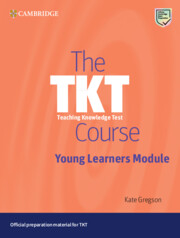Book contents
- Frontmatter
- Acknowledgements
- Contents
- Introduction
- Part 1 Knowledge of young learners and principles of teaching English to young learners
- Part 2 Planning and preparing young learner lessons
- Part 3 Teaching young learners
- Part 4 Assessing young learner learning in the classroom
- Follow-up activities: Answer keys and commentaries
- List of terms found in the TKT Glossary
- Glossary of TKT: Young Learners terms
- Test tips for TKT: Young Learners
- Teaching knowledge test young learners: Practice test
- Sample test answer sheet for TKT: YL practice test
- Answer key for TKT: YL practice test
Reflection on learning in Part 4
Published online by Cambridge University Press: 14 March 2024
- Frontmatter
- Acknowledgements
- Contents
- Introduction
- Part 1 Knowledge of young learners and principles of teaching English to young learners
- Part 2 Planning and preparing young learner lessons
- Part 3 Teaching young learners
- Part 4 Assessing young learner learning in the classroom
- Follow-up activities: Answer keys and commentaries
- List of terms found in the TKT Glossary
- Glossary of TKT: Young Learners terms
- Test tips for TKT: Young Learners
- Teaching knowledge test young learners: Practice test
- Sample test answer sheet for TKT: YL practice test
- Answer key for TKT: YL practice test
Summary
You have come to the end of Part 4. This part of The TKT Course: Young Learner Module aimed to deepen your awareness and skills relating to assessing young learner learning through classroom-based assessment. You explored purposes of assessing learning, focuses of assessing learning and ways teachers and learners may act on assessment evidence, including feedback.
This part of The TKT Course: Young Learner Module also aimed to support your knowledge and skills in preparation for the fourth part of the TKT: YL module test: Assessing Young Learners.
Look back to the introduction to Part 4. You assessed your level of understandingbefore beginning the unit. Re-assess your understanding in each area.
You also wrote two or three questions or areas to find out about in each unit. How well do you think you have answered these? What can you do to better achieve those you need to work on? For example:
Re-read a section of the unit(s)
Re-do or do more exploration activities (Second C of each unit).
Discuss the unit(s) content with other teachers in your school or network.
Re-do the TKT: YL practice task(s)
Look in the TKT glossary or the glossary in this book to check meanings of key terms and concepts.
Reflect on your classroom teaching more closely.
Look for other readings or resources on the topic(s).
Write yourself two or three objectives for further learning and development in your TKT: YL PD Journal.
■ References and further recommended reading
PART 4 REFERENCES
Britton, M. (2021). Assessment for Learning in Primary Language Learning and Teaching. Bristol: Multilingual Matters.
Hasselgreen, A. and Caudwell, G. (2016). Assessing the Language of Young Learners. London: British Council.
Nixon, C. and Tomlinson, M. (2017). Kid's Box. Level 1. Updated second edition. Cambridge: Cambridge University Press&Assessment.
Papp, S. (2019). Assessment of Young English Language Learners. In The Routledge Handbook of Teaching English to Young Learners. S. Garton&F. Copland (Eds.). Pp. 389-407. London: Routledge.
Petty, G. (2009). Teaching Today. A Practical Guide. (4th edition). Cheltenham: Nelson Thornes.
Shin, J. K., Savic´, V. and Machida, T. (2021). The 6 Principles for Exemplary Teaching of English Learners. Alexandria: TESOL International Association.
- Type
- Chapter
- Information
- The TKT Course Young Learners Module , pp. 147 - 148Publisher: Cambridge University PressPrint publication year: 2024

